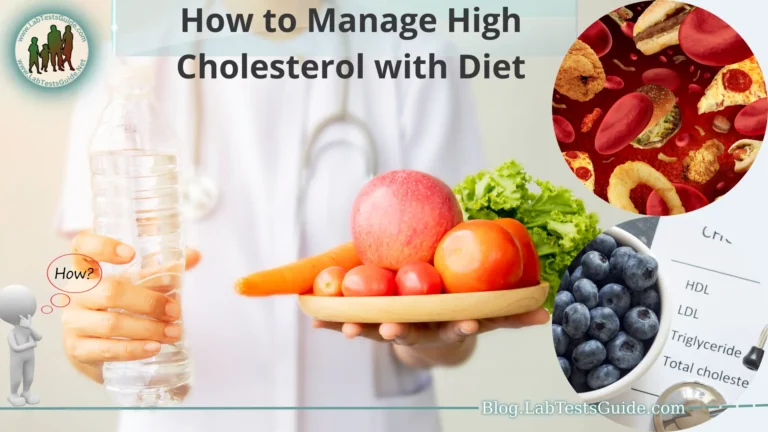High cholesterol is a common health concern affecting many individuals worldwide. It occurs when there are high levels of cholesterol, a fatty substance, in the blood. Elevated levels of cholesterol, particularly LDL cholesterol (often referred to as “bad” cholesterol), can increase the risk of developing heart disease and other cardiovascular conditions. While medical interventions like medication may be necessary in some cases, there are also several natural remedies that can help manage and reduce high cholesterol levels.

In this article, we will explore some effective natural remedies for high cholesterol. These remedies focus on making dietary changes, adopting a healthy lifestyle, and incorporating certain herbs and supplements. It’s important to note that these natural remedies should not replace medical advice or prescribed treatments. It is always recommended to consult a healthcare professional before implementing any significant changes to your diet or lifestyle. With that in mind, let’s delve into the natural remedies for high cholesterol that can be incorporated into a holistic approach to heart health.
Diet Modifications:
Here are some diet modifications that can help lower cholesterol.
Increase soluble fiber intake:
Soluble fiber helps reduce LDL cholesterol levels by binding to cholesterol in the digestive system and preventing its absorption into the bloodstream. Include the following in your diet:
- Whole grains like oats, barley, quinoa, and brown rice.
- Legumes such as lentils, chickpeas, and kidney beans.
- Fruits like apples, oranges, strawberries, and pears.
- Vegetables like Brussels sprouts, broccoli, carrots, and sweet potatoes.
Consume healthy fats:
While it’s important to limit saturated and trans fats, incorporating healthy fats into your diet can have a positive impact on cholesterol levels. Focus on.
- Monounsaturated fats found in olive oil, avocados, and nuts (such as almonds, walnuts, and pistachios).
- Polyunsaturated fats present in fatty fish (like salmon, mackerel, and trout), flaxseeds, chia seeds, and walnuts.
Reduce saturated and trans fats:
These fats can raise LDL cholesterol levels and increase the risk of heart disease. Limit your intake of.
- Fatty cuts of meat, including beef, pork, and lamb.
- Processed meats like sausages, hot dogs, and bacon.
- Full-fat dairy products such as whole milk, cheese, and butter.
- Trans fats found in processed foods, fried foods, and commercially baked goods like cookies, cakes, and pastries.
Include omega-3 fatty acids:
Omega-3 fatty acids have been shown to lower cholesterol levels and provide cardiovascular benefits. Incorporate the following sources into your diet.
- Fatty fish like salmon, mackerel, sardines, and trout.
- Plant-based sources such as chia seeds, flaxseeds, and walnuts.
- Consume plant sterols and stanols: These naturally occurring compounds can help lower LDL cholesterol levels. They work by blocking the absorption of cholesterol in the intestines. Foods fortified with plant sterols or stanols, such as certain margarines, can be beneficial additions to your diet.
Eat more fruits and vegetables: Fruits and vegetables are rich in antioxidants, fiber, and other beneficial compounds that promote heart health. Aim to include a variety of colorful fruits and vegetables in your meals to reap their cholesterol-lowering benefits.
Remember, it’s important to maintain an overall balanced and nutritious diet. Combine these dietary modifications with other healthy lifestyle practices, such as regular exercise and weight management, for optimal results in managing high cholesterol levels.
Regular exercise:
Here’s how exercise can be an effective tool in managing high cholesterol.
Aerobic exercises:
- Brisk walking or jogging
- Cycling or stationary biking
- Swimming or water aerobics
- Dancing or Zumba
- Rowing or elliptical machine workouts
- Duration and frequency: Aim for at least 150 minutes of moderate-intensity aerobic exercise or 75 minutes of vigorous-intensity aerobic exercise per week. Spread these sessions across several days to ensure consistency and effectiveness.
- Strength training: Incorporating strength training exercises into your routine can complement aerobic exercise and further improve cholesterol levels. Strength training helps build lean muscle mass, which increases your metabolic rate and aids in weight management. Examples of strength training exercises include:
- Weightlifting
Resistance band workouts
Bodyweight exercises like push-ups, squats, and lunges
Lifestyle integration: Find opportunities to be physically active throughout your day. Take the stairs instead of the elevator, walk or bike instead of driving for short distances, and incorporate physical activity into your daily routine. - Stay consistent: Regular physical activity is key. Aim for a routine that you enjoy and can stick to in the long term. Consistency is more important than intensity, so even moderate exercise done regularly can yield positive results.
Exercise not only helps improve cholesterol levels but also offers additional benefits such as weight management, improved blood pressure, better insulin sensitivity, and reduced risk of heart disease. By incorporating regular exercise into your lifestyle, you can enhance your overall cardiovascular health and effectively manage high cholesterol levels.
Weight Management:
Here are some key points regarding weight management and its impact on cholesterol.
- Set realistic weight loss goals: Aim to achieve and maintain a healthy weight based on your body mass index (BMI) and individual health considerations. Even a modest weight loss can have a significant impact on cholesterol levels.
- Calorie balance: Focus on creating a calorie deficit by consuming fewer calories than you expend. This can be achieved through a combination of a balanced diet and regular physical activity.
- Balanced and nutritious diet: Adopt a well-rounded eating plan that includes a variety of fruits, vegetables, whole grains, lean proteins, and healthy fats. Be mindful of portion sizes and avoid excessive consumption of processed foods, sugary beverages, and high-calorie snacks.
- Regular physical activity: Engage in regular exercise to aid in weight management. Combining aerobic exercises, strength training, and other physical activities can help burn calories, increase metabolism, and promote overall fitness.
- Behavioral changes: Implement healthy lifestyle habits that support weight management, such as mindful eating, portion control, and stress management techniques. Avoid emotional eating and seek healthier alternatives to cope with stress or boredom.
- Seek professional guidance: Consider consulting with a registered dietitian or healthcare professional specializing in weight management. They can provide personalized advice, create a tailored meal plan, and offer support and accountability.
Remember, weight management is a long-term commitment rather than a quick fix. Gradual and sustainable weight loss is generally more effective and easier to maintain. By achieving and maintaining a healthy weight, you can positively influence your cholesterol levels, reduce the risk of heart disease, and improve overall cardiovascular health.
Herbal Supplements:
Here are a few herbal supplements that have been studied for their potential cholesterol-lowering effects.
- Plant sterols and stanols: These compounds are naturally found in fruits, vegetables, nuts, and seeds. Plant sterols and stanols can help reduce LDL cholesterol by blocking its absorption in the intestines. They are often available in supplement form or added to certain foods like margarine or orange juice.
- Garlic: Garlic has been studied for its potential cholesterol-lowering properties. It may modestly reduce total cholesterol and LDL cholesterol levels. However, the evidence is not conclusive, and the exact mechanisms by which garlic affects cholesterol are still not well understood.
- Red yeast rice: Red yeast rice is a traditional Chinese fermented product that contains naturally occurring statins, which are compounds known to lower cholesterol. However, red yeast rice can vary in its content of active ingredients, and the concentration of statins may be inconsistent. Moreover, the use of red yeast rice should be done under medical supervision due to potential side effects and interactions with other medications.
It’s important to remember that herbal supplements should not replace prescribed medications or recommended lifestyle changes. They should be used with caution and under the guidance of a healthcare professional. Inform your healthcare provider about any herbal supplements you are considering to ensure they are safe and appropriate for your specific situation.
Green Tea:
Here’s what you should know about green tea and its potential effects on cholesterol:
- Antioxidants: Green tea contains powerful antioxidants called catechins, particularly epigallocatechin gallate (EGCG). These antioxidants have been shown to have various health benefits, including potential effects on cholesterol levels.
- LDL cholesterol reduction: Some studies suggest that consuming green tea may help lower LDL cholesterol levels. The catechins in green tea may inhibit the absorption of cholesterol in the intestines and enhance its excretion from the body, leading to a reduction in LDL cholesterol.
- HDL cholesterol and triglycerides: Green tea consumption may also have a positive impact on HDL cholesterol levels (the “good” cholesterol) and triglyceride levels. It has been observed to increase HDL cholesterol while reducing triglyceride levels in some studies.
- Optimal consumption: To potentially derive benefits from green tea, it is recommended to consume 2-3 cups per day. However, it’s important to note that the exact dosage, duration, and specific effects on cholesterol may vary between individuals.
- Synergistic effects: Green tea is often consumed as part of a healthy lifestyle, along with a balanced diet and regular exercise. Combining green tea consumption with other heart-healthy habits may have a more comprehensive impact on cholesterol management.
- Caffeine content: Green tea naturally contains caffeine, although in lesser amounts compared to coffee. If you are sensitive to caffeine or have certain health conditions, consider opting for decaffeinated green tea.
It’s important to remember that green tea should not be seen as a standalone solution for managing high cholesterol. It is best viewed as a complementary component of a holistic approach that includes a healthy diet, regular exercise, weight management, and other evidence-based interventions. As always, consult with a healthcare professional for personalized advice, especially if you have any existing health conditions or are taking medications that may interact with green tea.
Quit Smoking:
Here’s why quitting smoking is crucial for cholesterol management.
- Lower LDL cholesterol: Smoking contributes to the oxidation of LDL cholesterol, making it more likely to form plaque in the arteries. By quitting smoking, you can reduce the oxidation of LDL cholesterol and help prevent the progression of atherosclerosis.
- Increase HDL cholesterol: Smoking lowers HDL cholesterol levels, which are important for removing LDL cholesterol from the arteries. Quitting smoking allows HDL cholesterol levels to gradually increase, improving the overall cholesterol profile.
- Reduce inflammation: Smoking triggers inflammation in the body, which can contribute to the development and progression of atherosclerosis. By quitting smoking, you can help reduce inflammation, promoting better cardiovascular health.
- Improve blood circulation: Smoking narrows and damages blood vessels, impeding blood flow and increasing the risk of clot formation. When you quit smoking, blood circulation improves, decreasing the risk of heart disease, heart attacks, and strokes.
- Lower overall cardiovascular risk: Smoking is a significant risk factor for heart disease. By quitting smoking, you can significantly reduce your overall cardiovascular risk, including the risk associated with high cholesterol levels.
Quitting smoking is one of the most beneficial actions you can take to improve your cholesterol levels and overall cardiovascular health. It’s never too late to quit, and the benefits are long-lasting and significant.
Limit Alcohol Consumption:
Here’s why it’s important to limit alcohol consumption for cholesterol management:
- Impact on LDL cholesterol: Excessive alcohol intake can raise LDL (bad) cholesterol levels. It can also increase triglyceride levels, another type of fat in the bloodstream that is associated with an increased risk of heart disease.
- Blood pressure management: Heavy drinking can elevate blood pressure, which is a risk factor for heart disease. High blood pressure can contribute to the development of atherosclerosis and increase the strain on the heart and blood vessels.
- Weight management: Alcoholic beverages are often high in calories and can contribute to weight gain. Excess weight can lead to higher cholesterol levels, particularly LDL cholesterol. By limiting alcohol consumption, you can better manage your weight and cholesterol profile.
- Liver health: Excessive alcohol intake can lead to liver damage, including fatty liver disease and inflammation. Liver health is closely linked to cholesterol metabolism and the production of lipoproteins that carry cholesterol in the bloodstream.
- Interactions with medication: Alcohol can interact negatively with certain medications used to manage high cholesterol or other cardiovascular conditions. It’s important to consult with your healthcare professional to understand any potential interactions and receive personalized advice.
Conclusion:
Here’s a summary of the key points discussed:
Diet modifications: Adopt a healthy diet that includes fruits, vegetables, whole grains, lean proteins, and healthy fats. Limit saturated and trans fats, cholesterol-rich foods, and processed snacks. Incorporate cholesterol-lowering foods like oats, nuts, and legumes.
Regular exercise: Engage in aerobic exercises and strength training to improve cardiovascular health and lower cholesterol levels. Aim for at least 150 minutes of moderate-intensity aerobic exercise or 75 minutes of vigorous-intensity aerobic exercise per week.
Weight management: Maintain a healthy weight through a balanced diet and regular physical activity. Losing excess weight can help improve cholesterol levels.
Quit smoking: Quitting smoking is crucial for managing high cholesterol and reducing the risk of heart disease. Smoking damages blood vessels and negatively impacts cholesterol levels.
Limit alcohol consumption: Excessive alcohol intake can raise LDL cholesterol levels and contribute to high blood pressure. Limit alcohol consumption to moderate levels or as advised by healthcare professionals.
Herbal supplements: Some herbal supplements, such as plant sterols and stanols, garlic, and red yeast rice, have shown potential for cholesterol management. However, scientific evidence is limited, and it’s important to consult with healthcare professionals before using them.
It’s important to remember that natural remedies should be used as part of a comprehensive approach to managing high cholesterol, which may include prescribed medications, regular check-ups, and lifestyle changes. Consult with a healthcare professional for personalized advice and guidance based on your individual health needs.







One Comment